现代英语口语表示法500例
- 格式:doc
- 大小:44.50 KB
- 文档页数:5
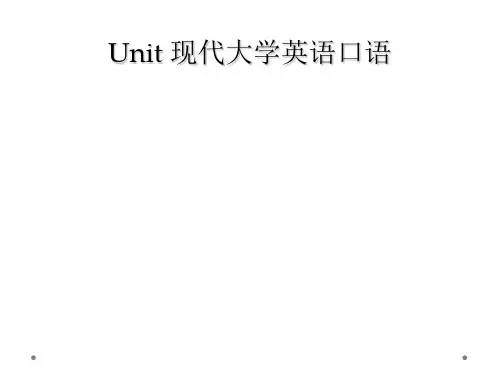
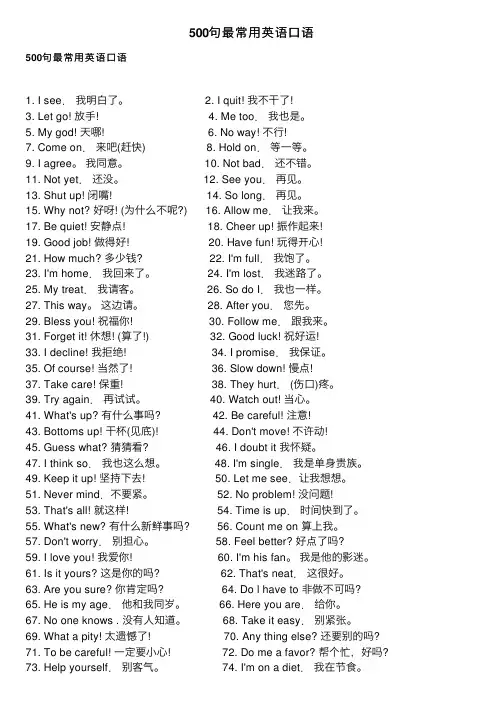
500句最常⽤英语⼝语500句最常⽤英语⼝语1. I see.我明⽩了。
2. I quit! 我不⼲了!3. Let go! 放⼿!4. Me too.我也是。
5. My god! 天哪!6. No way! 不⾏!7. Come on.来吧(赶快) 8. Hold on.等⼀等。
9. I agree。
我同意。
10. Not bad.还不错。
11. Not yet.还没。
12. See you.再见。
13. Shut up! 闭嘴! 14. So long.再见。
15. Why not? 好呀! (为什么不呢?) 16. Allow me.让我来。
17. Be quiet! 安静点! 18. Cheer up! 振作起来!19. Good job! 做得好! 20. Have fun! 玩得开⼼!21. How much? 多少钱? 22. I'm full.我饱了。
23. I'm home.我回来了。
24. I'm lost.我迷路了。
25. My treat.我请客。
26. So do I.我也⼀样。
27. This way。
这边请。
28. After you.您先。
29. Bless you! 祝福你! 30. Follow me.跟我来。
31. Forget it! 休想! (算了!) 32. Good luck! 祝好运!33. I decline! 我拒绝! 34. I promise.我保证。
35. Of course! 当然了! 36. Slow down! 慢点!37. Take care! 保重! 38. They hurt. (伤⼝)疼。
39. Try again.再试试。
40. Watch out! 当⼼。
41. What's up? 有什么事吗? 42. Be careful! 注意!43. Bottoms up! ⼲杯(见底)! 44. Don't move! 不许动!45. Guess what? 猜猜看? 46. I doubt it 我怀疑。

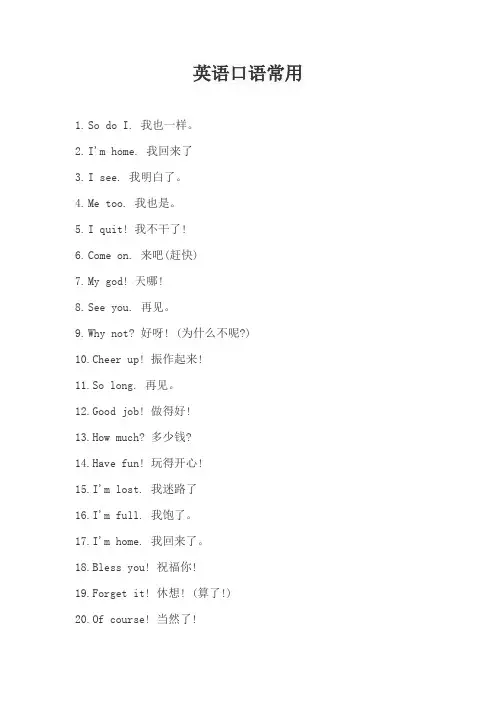
英语口语常用1.So do I. 我也一样。
2.I'm home. 我回来了3.I see. 我明白了。
4.Me too. 我也是。
5.I quit! 我不干了!e on. 来吧(赶快)7.My god! 天哪!8.See you. 再见。
9.Why not? 好呀! (为什么不呢?)10.Cheer up! 振作起来!11.So long. 再见。
12.Good job! 做得好!13.How much? 多少钱?14.Have fun! 玩得开心!15.I'm lost. 我迷路了16.I'm full. 我饱了。
17.I'm home. 我回来了。
18.Bless you! 祝福你!19.Forget it! 休想! (算了!)20.Of course! 当然了!21.Of course! 当然了!22.Watch out! 当心。
23.Don't move! 不许动!24.Bottoms up! 干杯(见底)!25.I'm single. 我是单身贵族。
26.Let me see.让我想想。
27.Guess what? 猜猜看?28.I'm in a hurry! 我在赶时间!29.Just wonderful! 简直太棒了!30.I don't mean it. 我不是故意的。
31.Any day will do. 哪一天都行夕32.What about you? 你呢?33.Just wonderful! 简直太棒了!34.It's a fine day。
今天是个好天。
35.So far,So good. 目前还不错。
36.You can make it! 你能做到!37.He lacks courage. 他缺乏勇气。
38.. How's everything? 一切还好吧?39. I have no choice. 我别无选择。
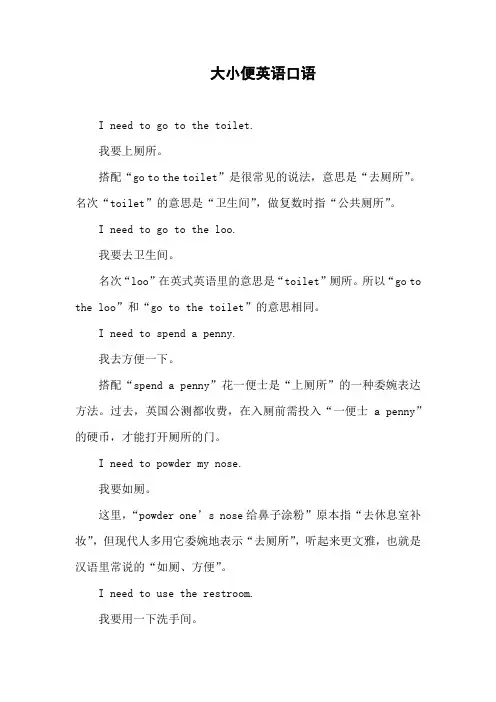
大小便英语口语I need to go to the toilet.我要上厕所。
搭配“go to the toilet”是很常见的说法,意思是“去厕所”。
名次“toilet”的意思是“卫生间”,做复数时指“公共厕所”。
I need to go to the loo.我要去卫生间。
名次“loo”在英式英语里的意思是“toilet”厕所。
所以“go to the loo”和“go to the toilet”的意思相同。
I need to spend a penny.我去方便一下。
搭配“spend a penny”花一便士是“上厕所”的一种委婉表达方法。
过去,英国公测都收费,在入厕前需投入“一便士 a penny”的硬币,才能打开厕所的门。
I need to powder my nose.我要如厕。
这里,“powder one’s nose给鼻子涂粉”原本指“去休息室补妆”,但现代人多用它委婉地表示“去厕所”,听起来更文雅,也就是汉语里常说的“如厕、方便”。
I need to use the restroom.我要用一下洗手间。
除了“toilet”和“loo”以外,“restroom”也可以用来表示“公共卫生间”。
上厕所怎么用英语口语含蓄地说1. I’m going to the loo.无论你是正在开一个会议,或是正在和朋友聚会,只要你想告诉同伴你要离席去一趟卫生间,你都可以用这个表达。
这句话中的 loo 也可以替换成其它表示“卫生间”的单词,比如 toilet 或bathroom。
2. I’m nipping to the loo.To nip 的意思就是“很快地去一个离你所在地不远的地方”。
那么去上厕所就可以说 to nip to the loo,表示“我需要很快地去一下卫生间,马上回来。
”3. I’m popping to the loo.除了 nip 以外,在英国你还可能听到人们用 pop这个词来表示“去某地”。
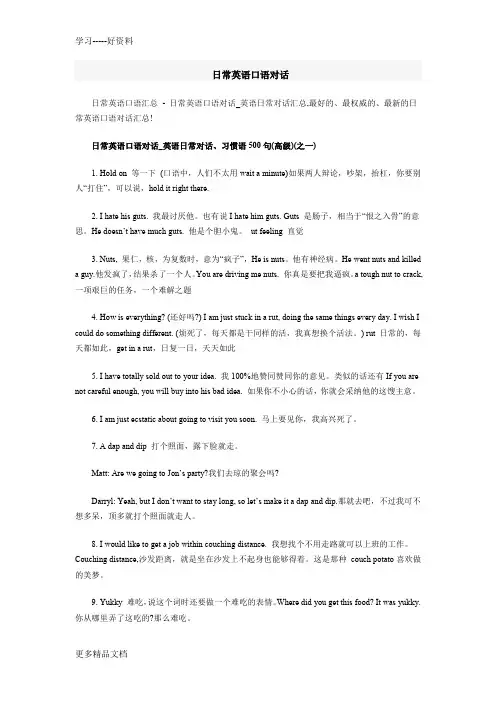
日常英语口语对话日常英语口语汇总- 日常英语口语对话_英语日常对话汇总,最好的、最权威的、最新的日常英语口语对话汇总!日常英语口语对话_英语日常对话、习惯语500句(高级)(之一)1. Hold on 等一下(口语中,人们不太用wait a minute)如果两人辩论,吵架,抬杠,你要别人“打住”,可以说,hold it right there.2. I hate his guts. 我最讨厌他。
也有说I hate him guts. Guts 是肠子,相当于“恨之入骨”的意思。
He doesn’t have much guts. 他是个胆小鬼。
ut feeling 直觉3. Nuts, 果仁,核,为复数时,意为“疯子”,He is nuts。
他有神经病。
He went nuts and killeda guy.他发疯了,结果杀了一个人。
You are driving me nuts. 你真是要把我逼疯。
a tough nut to crack, 一项艰巨的任务,一个难解之题4. How is everything? (还好吗?) I am just stuck in a rut, doing the same things every day. I wish I could do something different. (烦死了,每天都是干同样的活,我真想换个活法。
) rut 日常的,每天都如此,get in a rut,日复一日,天天如此5. I have totally sold out to your idea. 我100%地赞同赞同你的意见。
类似的话还有If you are not careful enough, you will buy into his bad idea. 如果你不小心的话,你就会采纳他的这馊主意。
6. I am just ecstatic about going to visit you soon. 马上要见你,我高兴死了。
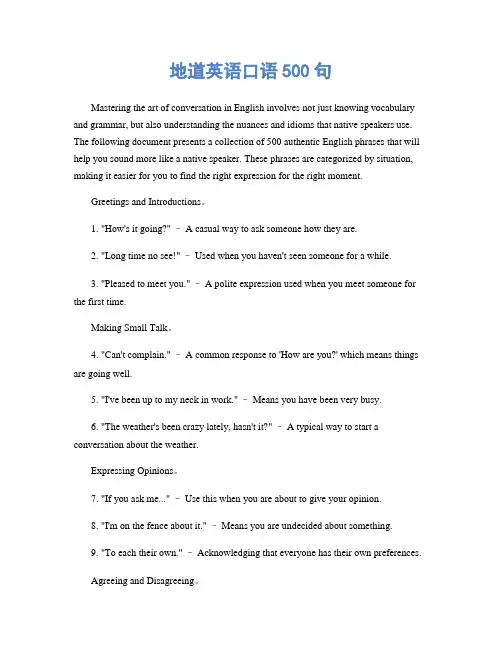
地道英语口语500句Mastering the art of conversation in English involves not just knowing vocabulary and grammar, but also understanding the nuances and idioms that native speakers use. The following document presents a collection of 500 authentic English phrases that will help you sound more like a native speaker. These phrases are categorized by situation, making it easier for you to find the right expression for the right moment.Greetings and Introductions。
1. "How's it going?" – A casual way to ask someone how they are.2. "Long time no see!" – Used when you haven't seen someone for a while.3. "Pleased to meet you." – A polite expression used when you meet someone for the first time.Making Small Talk。
4. "Can't complain." – A common response to 'How are you?' which means things are going well.5. "I've been up to my neck in work." – Means you have been very busy.6. "The weather's been crazy lately, hasn't it?" – A typical way to start a conversation about the weather.Expressing Opinions。
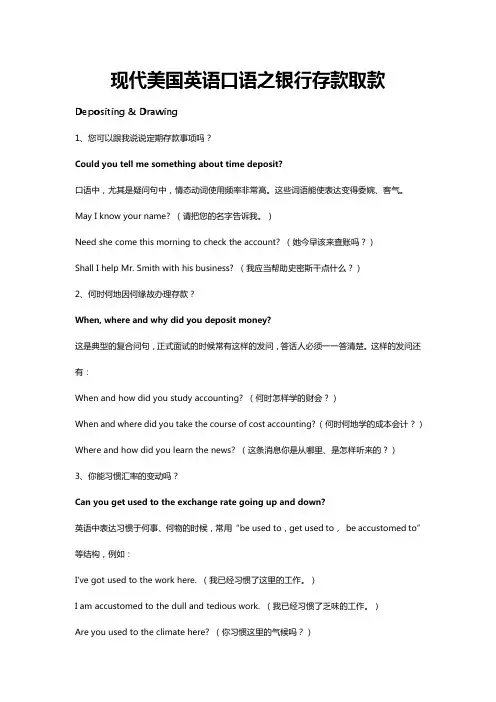
现代美国英语口语之银行存款取款Depositing & Drawing1、您可以跟我说说定期存款事项吗?Could you tell me something about time deposit?口语中,尤其是疑问句中,情态动词使用频率非常高。
这些词语能使表达变得委婉、客气。
May I know your name? (请把您的名字告诉我。
)Need she come this morning to check the account? (她今早该来查账吗?)Shall I help Mr. Smith with his business? (我应当帮助史密斯干点什么?)2、何时何地因何缘故办理存款?When, where and why did you deposit money?这是典型的复合问句,正式面试的时候常有这样的发问,答话人必须一一答清楚。
这样的发问还有:When and how did you study accounting? (何时怎样学的财会?)When and where did you take the course of cost accounting? (何时何地学的成本会计?)Where and how did you learn the news? (这条消息你是从哪里、是怎样听来的?)3、你能习惯汇率的变动吗?Can you get used to the exchange rate going up and down?英语中表达习惯于何事、何物的时候,常用“be used to,get used to,be accustomed to”等结构,例如:I've got used to the work here. (我已经习惯了这里的工作。
)I am accustomed to the dull and tedious work. (我已经习惯了乏味的工作。
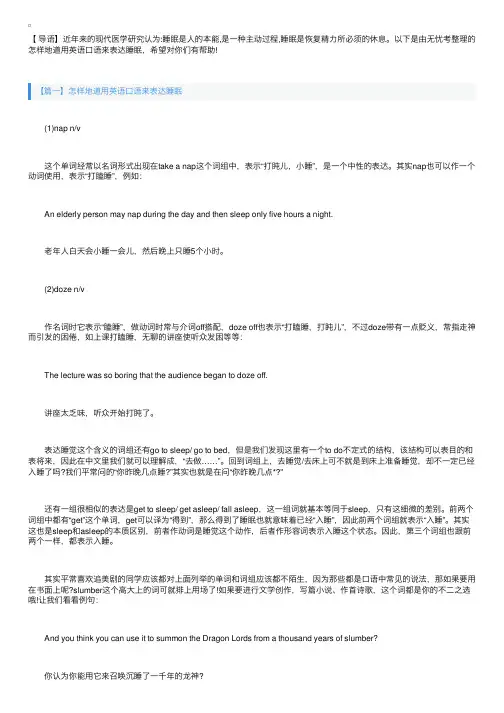
【导语】近年来的现代医学研究认为:睡眠是⼈的本能,是⼀种主动过程,睡眠是恢复精⼒所必须的休息。
以下是由⽆忧考整理的怎样地道⽤英语⼝语来表达睡眠,希望对你们有帮助!【篇⼀】怎样地道⽤英语⼝语来表达睡眠 (1)nap n/v 这个单词经常以名词形式出现在take a nap这个词组中,表⽰“打盹⼉,⼩睡”,是⼀个中性的表达。
其实nap也可以作⼀个动词使⽤,表⽰“打瞌睡”,例如: An elderly person may nap during the day and then sleep only five hours a night. ⽼年⼈⽩天会⼩睡⼀会⼉,然后晚上只睡5个⼩时。
(2)doze n/v 作名词时它表⽰“瞌睡”,做动词时常与介词off搭配,doze off也表⽰“打瞌睡,打盹⼉”,不过doze带有⼀点贬义,常指⾛神⽽引发的困倦,如上课打瞌睡,⽆聊的讲座使听众发困等等: The lecture was so boring that the audience began to doze off. 讲座太乏味,听众开始打盹了。
表达睡觉这个含义的词组还有go to sleep/ go to bed,但是我们发现这⾥有⼀个to do不定式的结构,该结构可以表⽬的和表将来,因此在中⽂⾥我们就可以理解成,“去做……”。
回到词组上,去睡觉/去床上可不就是到床上准备睡觉,却不⼀定已经⼊睡了吗?我们平常问的“你昨晚⼏点睡?”其实也就是在问“你昨晚⼏点*?” 还有⼀组很相似的表达是get to sleep/ get asleep/ fall asleep,这⼀组词就基本等同于sleep,只有这细微的差别。
前两个词组中都有“get”这个单词,get可以译为“得到”,那么得到了睡眠也就意味着已经“⼊睡”,因此前两个词组就表⽰“⼊睡”。
其实这也是sleep和asleep的本质区别,前者作动词是睡觉这个动作,后者作形容词表⽰⼊睡这个状态。
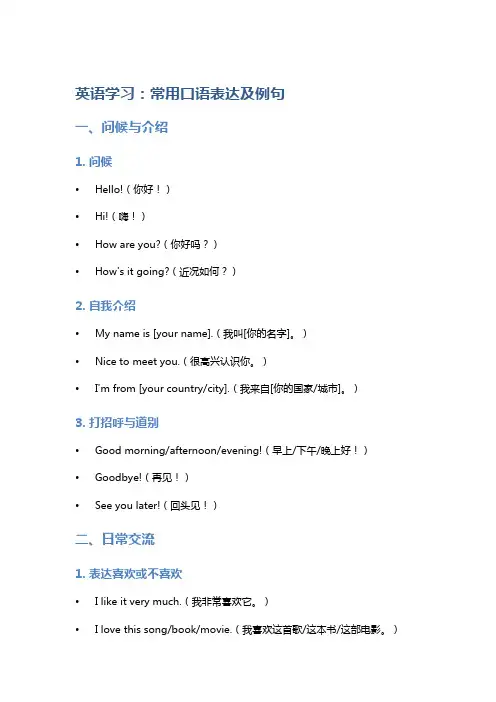
英语学习:常用口语表达及例句一、问候与介绍1. 问候•Hello!(你好!)•Hi!(嗨!)•How are you?(你好吗?)•How's it going?(近况如何?)2. 自我介绍•My name is [your name].(我叫[你的名字]。
)•Nice to meet you.(很高兴认识你。
)•I'm from [your country/city].(我来自[你的国家/城市]。
)3. 打招呼与道别•Good morning/afternoon/evening!(早上/下午/晚上好!)•Goodbye!(再见!)•See you later!(回头见!)二、日常交流1. 表达喜欢或不喜欢•I like it very much.(我非常喜欢它。
)•I love this song/book/movie.(我喜欢这首歌/这本书/这部电影。
)•I don't like spicy food.(我不喜欢辣食。
)2. 请求帮助或建议•Can you help me, please?(请问你能帮个忙吗?)•What do you suggest we do? (你建议我们做什么?)•Could you give me some advice? (你可以给我一些建议吗?)3. 表达感谢•Thank you.(谢谢。
)•Thanks a lot.(非常感谢。
)•I really appreciate it.(我真的很感激。
)三、购物与餐饮1. 餐厅用语•Can I have the menu, please?(可以给我菜单吗?)•What's the specialty of this restaurant?(这家餐厅的特色菜是什么?)•I'd like to order a steak and a glass of red wine. (我想要一份牛排和一杯红酒。
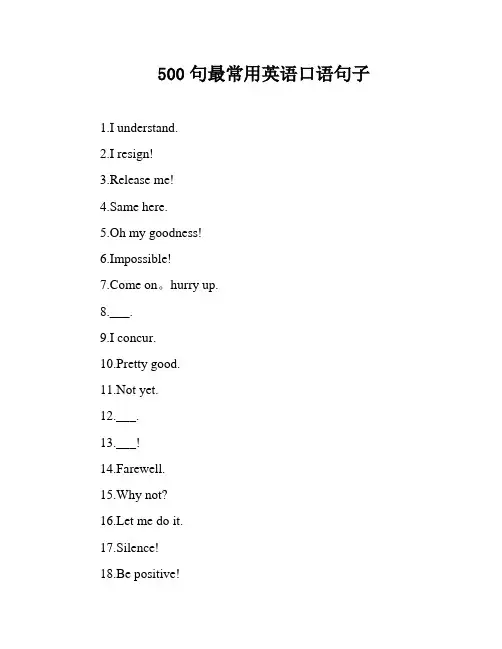
500句最常用英语口语句子1.I understand.2.I resign!3.Release me!4.Same here.5.Oh my goodness!6.Impossible!e on。
hurry up.8.___.9.I concur.10.Pretty good.11.Not yet.12.___.13.___!14.Farewell.15.Why not?16.Let me do it.17.Silence!18.Be positive!19.Well done!20.Enjoy yourself!21.How much does it cost?22.I am full.23.I am back.24.I am lost.25.My treat.26.Me too.27.This way。
please.28.After you.29.Bless you!30.Follow me.31.et it.32.Good luck!33.I refuse.34.I give you my word.35.Definitely!___.37.Take care!38.It hurts.39.___.40.Be careful!41.What's going on?42.Be us!43.Cheers!44.Stay still!45.Can you guess?46.I am skeptical.47.I ___.48.I am single.49.Keep going!50.Let me think.51.It doesn't matter.52.No problem!53.That's all!54.Time is running out。
时间不多了。
55.What's the latest。
有什么最新消息吗?56.Count me in。
把我算上。
57.Don't fret。
现代酒店结账退宿常用的英语口语C=Cashier 收银员 G=Guest 顾客C:Good morning, sir. May I help you?先生,您早,有可以帮到您吗?G:Yes, I’d like to check out.我想退宿。
C:Certainly sir. May I have your room key, please?好的,请把房间钥匙给我,好吗?G:Sure, Here it is.好的,给你。
C:J ust a moment, please. I’ll draw up your bill for you.请等一下,我帮您结帐。
(After a while 过了一会儿)C:Mr. Johnson, your bill totals US$520, How would you like to make the payment?约翰逊先生,您的账单总计是 520 美元。
您打算如何付款?G:By credit card. Do you aept Visa?用信用卡。
你们承受维萨信用卡吗?C:Yes, Mr. Johnson.是的,约翰逊先生。
G:Here you are.给你。
C:(Print the card)Could you sign here , please?请您在这儿签名,好吗?G:Sure.好的。
C:Thank you, Mr. Johnson. Here is your credit card and your receipt. Have a nice trip.谢谢您,约翰逊先生。
这是您的卡和收据。
祝您旅途愉快。
1) Just a moment, please. The cashier will have yourbill ready in a moment.请稍等,收银员马上会准备好您的账单。
2) I will calculate/draw up the bill for you.我帮您结账单。
I. Common phrases to ask how someone is:1.What’s up?2.What’s new?3.How’s it going?4.How’s everything?5.How are things?6.How’s life?7.How’s life treating you?8.What have you been up to recently? II. Common phrases to say how you are:9.I’m fine, thanks. How are you?10.Pretty good!11.Same old really!12.Not so great really!13.Could be better!14.Can’t Complain!III. Common phrases to say thank you:1.I really appreciate that/it!2.I’m really grateful!3.That’s so kind of you!4.I owe you one/big time!IV. Common phrases to respond to thank you:1.You’re most welcome!2.No worries!3.My pleasure!4.Any time!V. Common phrases to ask for information:1.Do you have any clue/idea…?2.You wouldn’t happen to know ….,would you?3.I don’t suppose you (would) know …?VI. Common phrases to say I don’t know:1.I have no idea!2.I haven’t got a clue!3.Sorry, I can’t help you there!4.I’m not really sure!5.I’ve been wondering the same thing/that, too! VII. Common phrases for agreeing:1.Exactly!2.Absolutely!3.That’s so true!4.That’s so right!5.I agree 100%!6.I couldn’t agree more!7.Tell me about it!VIII. Common phrases for disagreeing:1.I’m not so sure about that.2.That’s not how I see it.3.Not necessarily!4.I can’t really agree with you there!IX. Common phrases to end a conversation:1.Well, was nice chatting with you.2.Right! I need to get going!3.I must be off!X. Common phrases for saying goodbye:1. Speak (to you) soon!2. Send my love to your family!3. Bye bye!4. You take care now!/ Take care!5. Have a good one!6. Talk to you later.。
- 1 - 现代英语口语表示法500例 1——60 · One’s brain child某人的主意,某人想出来的 等同于one’s original idea one’ brain children(复数) The new ways of teaching which have been proved very effective are brain children of all teaching staff of our department.
· Have a chip on one’s shoulder叫阵,叫板 He is not popular among his peers. He always seems to have a chip on his shoulder. 此外该语还有“不满”,“对抗”的意思 Mary has got a chip on her shoulder about not having obtained the scholarship. · Clam up守口如瓶,拒不开口,沉默不语 I don’t understand why my students are quite talkative during the break but all clam up in class.
· Take someone to the cleaners使人囊中如洗,一贫如洗 Don’t ask me to play in a crap game. I don’t want to be the cleaners. · A cliff-hanger扣人心玄的事情 Peter was nearly involved in a car accident. He called it a narrow escape. But it was really a cliff-hanger.
· Fight the clock争分夺秒,与时间赛跑 等同于work against the clock If you don’t fight the clock to enrich yourself, you will surely be lagged behind soon. · A clotheshorse讲究穿戴的人 Princess Diana was a real clotheshorse. It’s hard to imagine how much she had spent on clothes.
· Get hot under the collar发怒,怒气冲天 Make someone hot under the collar He got hot under the collar when he found his bicycle was missing. · Come through with flying colors干得出色,大获成功 In the 13th Asian Games, Chinese athletic team came through with flying colors · Show (reveal) one’s true colors原形毕露 He always appears polite and gentle. But his quarrelling with others in dirty words show his true colors.
· Come up with找出,想出,弄出,提出 - 2 -
等同于to produce, to find out, to think out After three days’of deep thinking, the manager came up with an idea of promoting the products.
· Jump to conclusions仓促的下结论 Being a teacher, he shouldn’t jump to conclusions that a student is not worth teaching simply because he fails one exam.
· To one’s heart’s content心满意足 Today is weekend. The lights won’t go off after 11 o’clock. We can chat to our heart’s content.
此外该语还有“随心所欲”的意思 Mary loves keeping diary. She can express her emotion to her heart’s content. · Lose one’s cool沉不住气 反义词keep one’s cool In the boxing match. Tyson lost his cool and bit Hollyfield’s ear. · Play it cool不露声色,沉着冷静 Sampras, the No. 1 tennis player in the world, always plays it cool when he wins in the match.
· e rotten to the core坏透了、烂透了 Keep away from that boy. He is rotten to the core. · cut corners偷工减料、走捷径、图省事、节约 Student is a serious thing. You can't expect to cut corners. cut corners并不是都是贬义的,还表示节约,节省 With only $100 left, he had to cut corners to make his journey back home. · have a crush on someone迷恋某人 Some teenager girls got a crush on the film star · be a far cry from...与……相差甚远(一般用来表示水平或程度等的差距) Though Dick has tried hard, it is still a far cry from what his father expects of him. · chew the cud好好琢磨琢磨 I don't want to jump to conclusions, I have to chew the cud on it for a few days. · be cut out for...天生适合于……(用于否定句中) Thank you for your kindness, but I can't accept it. You know, I'm not cut for a manager. · be completely in the dark一无所知,仍蒙在鼓里 keep someone in the dark; be left (kept) in the dark He is a dictator. Though I'm the production manager, I'm completely in the dark as what to do next. - 3 -
· a blind date初次约会 James was too excited to have dinner. He was having a blind date with Sue in the evening. · have seen better days今非昔比 Look at our dean, He has seen better days. · be out of one's depth力所不及 Liu was extremely happy to have been admitted to Oxford, but soon he found he was out of his depth in his major.
· give someone a dose of his own medicine以其人之道还制其人之身 On April Fool's Day, my classmates made me an April Fool. Next year, I'll give him a dose of his own medicine.
· a drop in the bucket沧海一粟 He has suffered a lot in his life. Losing his job this time was only a drop in the bucket. · play dumb with someone装聋作哑 It's no use playing dumb with teachers. They know very well their students. · be down in dumps垂头丧气,深情沮丧 I burned midnight oil yesterday. So I feel down in the dumps today. · make the dust fly干得很起劲 Many volunteers are helping in the Olympic Games. They are making the dust fly without getting pay.
· go easy on...酌情处理……;节约使用……;对……手下留情 I hope the teacher will go easy on me. Otherwise, I'll have no chance to pass the exam. 当介词on的后面跟得是something的时候,此语用来是“节约使用”或“小心对待” Go easy on salt. We have to save some for the next meal. · egg someone on to do something怂恿,鼓动某人干某事 Haven't you seen him through? He can help you nothing but egg you on to do illegal things. · rub elbows with someone和某人没有很深的交情 I suppose Jack doesn't know me well. We have only rubbed elbows with other for several times.